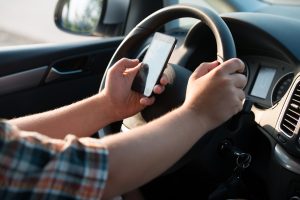 In this space, we typically discuss issues related to OVI/DUI law. Today, however, we’re going to take a brief detour and discuss a growing issue: distracted driving. With the near ubiquity of cell phones, instances of fatal car accidents caused by distracted drivers have approached 3,500 nationally in recent years. This year, the State of Ohio passed a new law in an effort to combat this problem.
In this space, we typically discuss issues related to OVI/DUI law. Today, however, we’re going to take a brief detour and discuss a growing issue: distracted driving. With the near ubiquity of cell phones, instances of fatal car accidents caused by distracted drivers have approached 3,500 nationally in recent years. This year, the State of Ohio passed a new law in an effort to combat this problem.
The new law is not the first Ohio statute to combat distracted driving. Ohio has had a law against texting while driving on the books since 2012. The Ohio General Assembly now addresses the reality that smart phones present numerous distractions beyond simply texting. Effective October 29, 2018, ORC 4511.991 gives police and prosecutors the ability to enhance the sentence for a traffic offense committed while distracted if the distracting activity is a contributing factor to the commission of the offense. If this enhancement is proven, courts can assess up to an additional $100 in fines on top of any fines levied for the underlying traffic offense. Defendants can then choose to either pay the additional fines or take an online distracted driving safety course.
Of course, this leads us to the most important question: what constitutes distracted driving? The statute breaks it down into two sections. The first section prohibits using a cell phone or other handheld electronic device while driving. This prohibition is subject to certain exceptions, including:
- Using speakerphone;
- Using your phone with a “voice-operated or hands free” device (Bluetooth, Apple Car Play, etc.); and
- Any device that is physically or electronically integrated into the motor vehicle (this would seem to cover the radio and onboard navigation screens).
This law expands the list of prohibited phone activities from texting to pretty much anything that requires you to look at your phone’s screen. Additionally, these exceptions would not cover using your phone for navigation while holding it in your hand. If you run a red-light while checking your phone for directions, you could very well be looking at increased fines.
The second section is much more vague. It prohibits “Engaging in any activity that is not necessary to the operation of a vehicle and impairs, or reasonably would be expected to impair, the ability of the operator to drive the vehicle safely.” This catch-all provision seems like it could apply to everything from trying to find something in your glove box to eating while driving. So long as the activity contributes to your traffic violation, you can expect to see a higher fine.
Like any new (and seemingly broad) traffic law, there will be some growing pains while the courts and law enforcement sort out how to apply a new set of rules. How will prosecutors prove that a driver was distracted and that the distraction was an underlying cause of the traffic violation? Will the officer’s testimony be enough? Will they have to provide some kind of phone records? These questions remain to be answered. This is why it is important to consult with criminal defense attorneys who are well versed in traffic laws and can help guide you through the process.
 Columbus OVI/DUI Attorney Blog
Columbus OVI/DUI Attorney Blog

